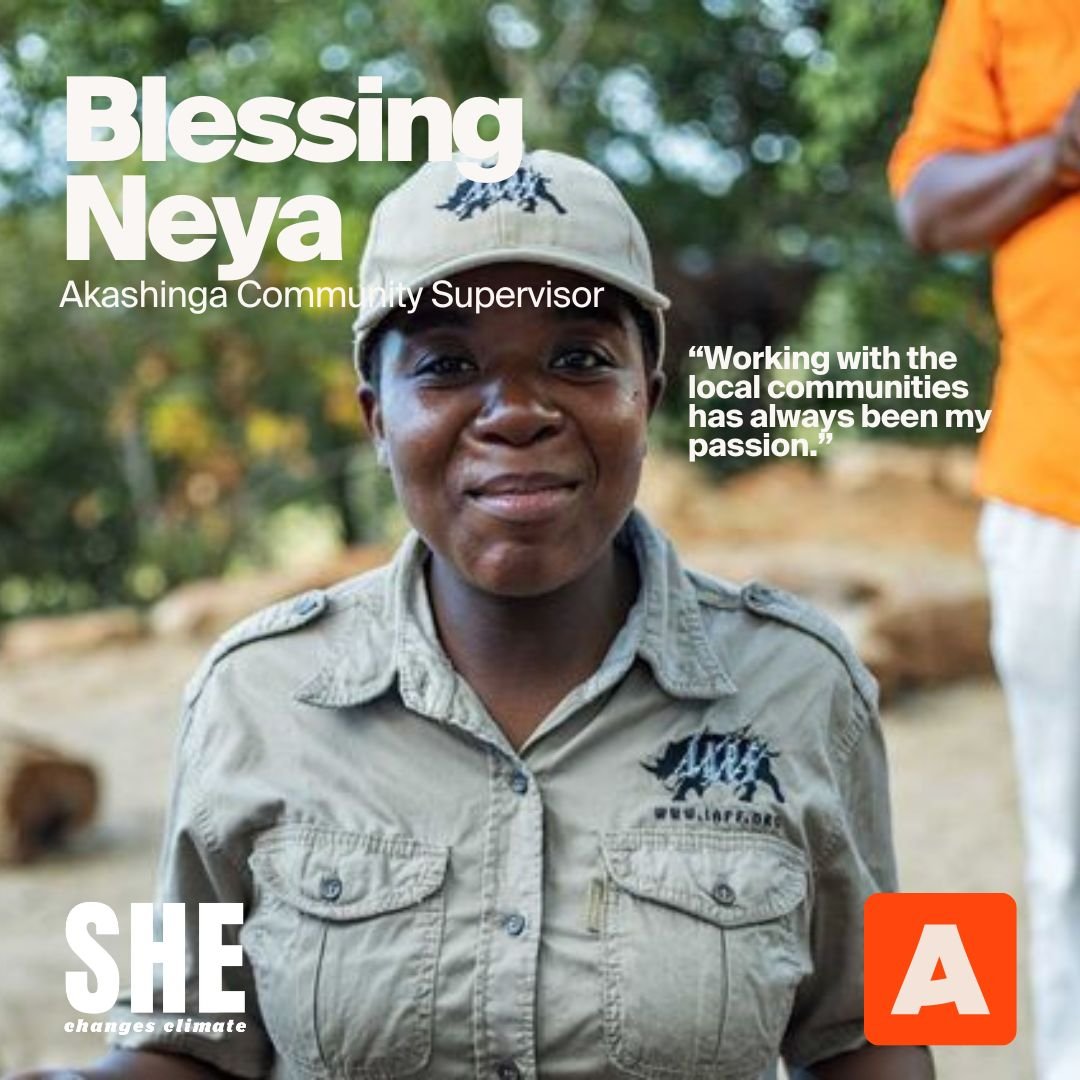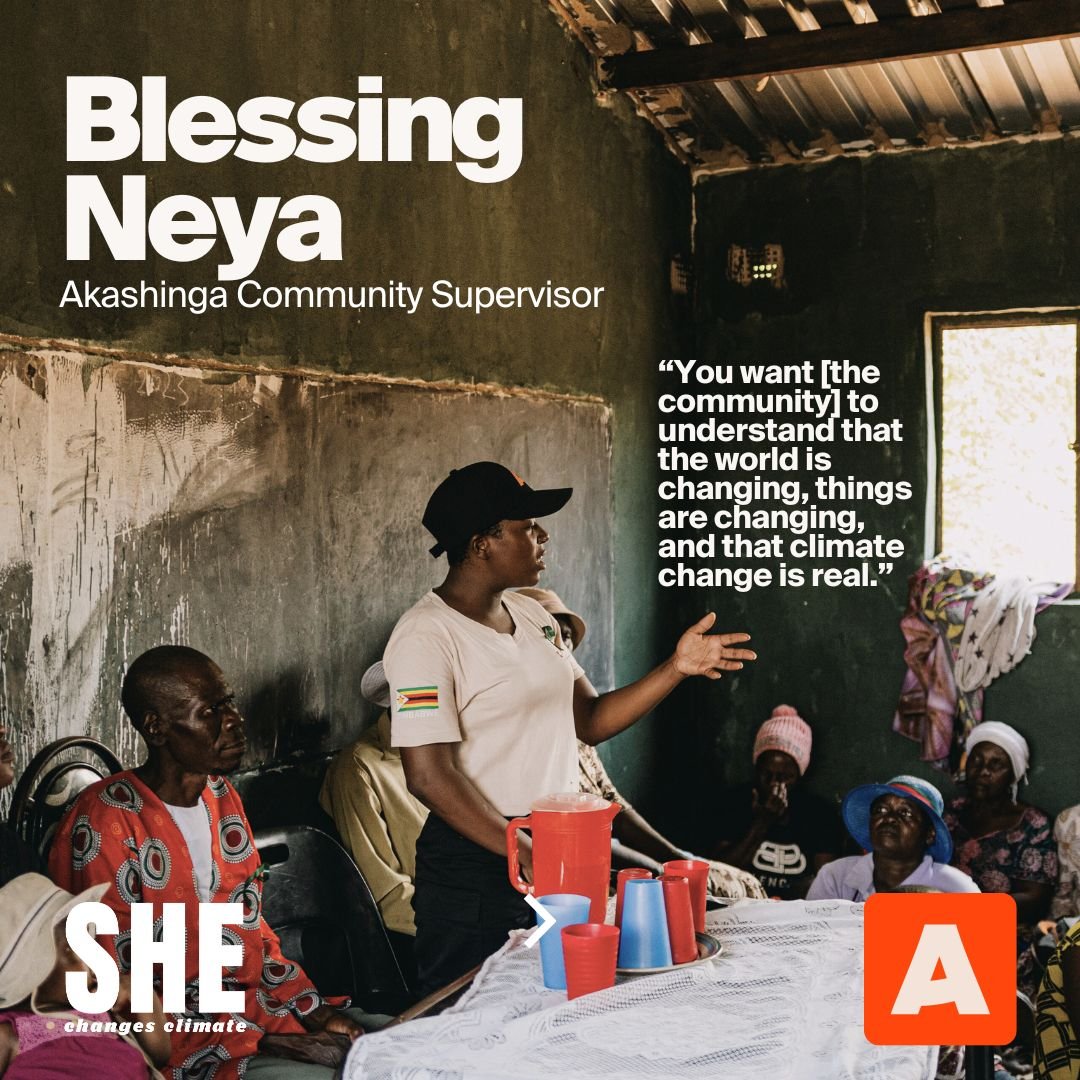Blessing Neya: Mending Bridges for Human-Wildlife Coexistence
The people of Hurungwe in Zimbabwe often beam with pride at the sight of Blessing Neya. She is, after all, one of their own, and an exemplary product of communal upbringing.
Clad in her khaki Akashinga outfit, Blessing is as fit as a fiddle and fierce; but her humble disposition soon reveals itself when she’s seated amidst her people, attentive to the discussions, empathetic to the challenges they face, considering her response to their plights.
The reality is this: although the area neighbors the Mana Pools National Park, it is still largely rural and remote, making it marginalized but also dealing with the dilemma of human-wildlife conflict. Disagreements between community members and park rangers is another challenge. And yet, Blessing stays true to her name as she speaks up to offer advice and resolve disagreements. Conflict-resolution approaches come naturally and it shows.
Throughout her time as a Community Supervisor with Akashinga—an anti-poaching foundation, Blessing has built and consistently maintained trust with the rural community, guided by the compass which has always pointed her towards serving the people that raised her. This has made her role all the more meaningful.
She chartered this career path with intention, harnessing her skills and values as she advanced in her role.
Having grown up in this culturally vibrant area that’s made up of about 80 villages, from a young age, she came to understand the challenges that come with human proximity to wildlife corridors. Only later did she fully grasp that changes in weather patterns fast-tracked these challenges. Her people were (and still are) forced to look for water and firewood, causing them to encroach on the Park. Similarly for the wildlife, scarcity in food has pushed them to communal zones where they attack livestock.
This cycle of survival has impacted biodiversity and caused financial strain for the community members. But still, Blessing remains cautious to view these recurring challenges from a solution lens, and began to envision her role as one who works with the community that raised her, driving sustainable solutions for her people, considerate of the importance of wildlife conservation.
Working with a wildlife conservation institution was a bold move to many who were watching her step into this career. At the time, and even in subsequent years, rangers were viewed as an enemy of the people, unfavorably known for arresting, and in some cases physically assaulting community members. Understanding this pre-existing narrative informed her choice to bring in a different approach into the work she would soon do, making sure that trust was at the heart of her work.
Indeed, community education needed to soon follow as science, data and everyday realities pointed to climate change as a problem adversely affecting various regions. Once trust was firm, then came conversations on this matter, in local dialects and with framing that made the concept easier to understand.
As luck would have it, her efforts were noted at work, and Blessing’s dream of working directly with the community came to be when she was appointed as Akashinga’s first Community Supervisor. Although she had her work cut out for her, she was able to build a team, making necessary adjustments to retain community trust , and educate, while upholding Akashinga’s values and work around wildlife conservation.
Although she loves what she does, Blessing’s work has not been easy. As a woman working in a field that has historically been male-dominated and with a community that is still largely patriarchal, she has had to wade through rumors that have threatened to assassinate her character. You see, not everyone takes lightly the fact that a woman dresses in a ranger outfit and spends most of her days in meetings convened by men. In fact, in a lot of rural areas in Africa, this is seen as taboo. But Blessing has chosen to maintain professionalism, all the while building her confidence and looking at the bigger picture of her involvement with the community in general. In turn, she has inspired many, mostly young girls who now see themselves as future rangers.
Coming to the present, the community in this area of Southern Africa continues to explore ways to generate income using natural resources available, though at the cost of drying rivers — and with rainfall patterns no longer predictable, Zimbabwe is one of many countries navigating a tumultuous dry season, exacerbating gender related challenges for women and girls, with the latter fated with child marriages.
It’s clear that education and awareness still has a way to go when it comes to climate change and ushering in an era of women leaders in rural areas. Blessing has her sights on getting even more practical with the people she engages with – her people. Through her work, she has already begun incorporating an educational approach to environmental and wildlife conservation, challenging her audience to look beyond but not fully ignore traditional, while being mindful of scientific facts, especially on coexisting with wildlife.
In essence, what still sticks out like a sore thumb is that rural areas are still marginalized and this is seen in policies and legislation. As the blessing and solution provider that she is, Blessing has now taken on another task, to research and explore programs and avenues that will further equip her to refine these policies, so that they are more equitable and have significant longevity.


This story has been co-developed by SHE Changes Climate and Akashinga as part of a broader conservation series titled SHE for Earth. The series highlights narratives of women in all their diversity driving conservation efforts.
